Table of Contents
Is your child struggling with CVC word worksheets? If yes, it might be because you have missed an important step along the way. Your child must do a lot of hands-on activities before worksheets. Preschool reading activities should be introduced in a proper step-by-step sequence. So it’s time to put the worksheets away, take a few steps back and get some hands-on materials ready. Three-letter phonetic words are also known as CVC words (Consonants.Vowels.Consonants). In the Montessori environment, they are referred to as the Pink Scheme. The step-by-step procedure I follow for Pink Scheme has 9 stages. This is also the proper Montessori Method. The composing stage is called Analysis and the Reading stage is called Synthesis.

Stage 1: Phonic Sounds

Materials:
Sandpaper Letters, Movable Alphabet, Sound Cards and Picture Cards
Before learning words, the child should have a good knowledge of phonic sounds. But it is not necessary to wait till the child learns all the sounds to introduce CVC words. There is no exact number, but the child needs to know at least 5-8 sounds to start composing words. After that, you can continue to introduce new sounds in parallel with CVC words. Introduce the sounds with Sandpaper Letters. Then show the child how to associate the sounds to the beginning sound words. The child can practice this activity with Movable Alphabet/Sound Cards and Picture Cards.
Here is a way you can do this stage Digitally with Boom Cards™. Find out what Boom Cards are
Shop for CVC Printable Materials
Stage 2: Composing Three-letter Phonetic Words
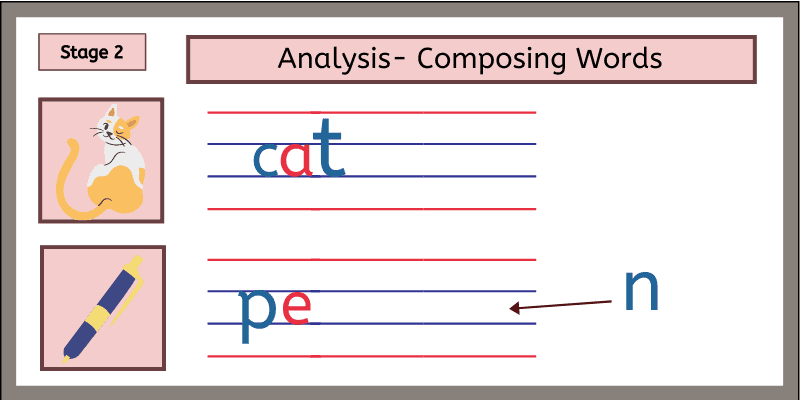
Materials:
Movable Alphabet
Composing words is a lot different than reading. It is the opposite. Even if the child knows the sounds, they are not yet ready for reading. At this stage, the child builds the words with picture aids. It can be small Objects or Picture Cards. The child can say the word and build it with Movable Alphabet. If you don’t have a Montessori Movable Alphabet, you can easily DIY with the Printables. You can even use magnetic letters or any alternative. The key is to have separate letters that the child can pick and build words.
Here is a way you can do this stage Digitally with Boom Cards™. Find out what Boom Cards are
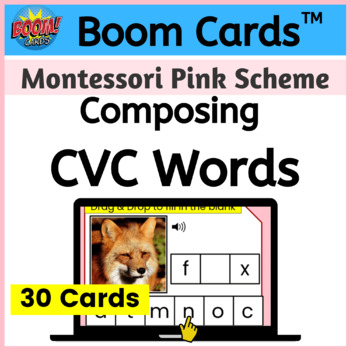
Get the Printable Montessori Pink Scheme (CVC) Picture Cards and Word Cards here
Stage 3: Writing Three-letter Phonetic Words
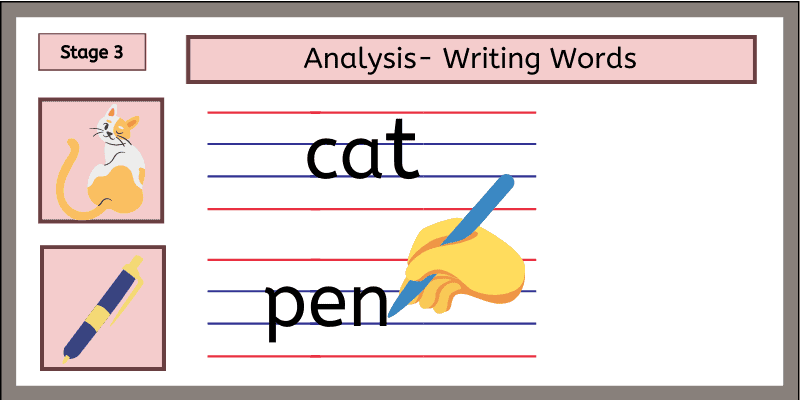
Materials:
Sand tray, paper and pencil
At this stage, writing words is a lot like building words. They should have small Objects or Picture cards. The child can say the word first and then write. Sandpaper letters are a great way to learn the shape of the letter in association with the sound. The child should have good fine motor skills and hand-eye coordination as well.
Find out more about Montessori inspired Pre-writing skills here.
Stage 4: Reading the First Letter
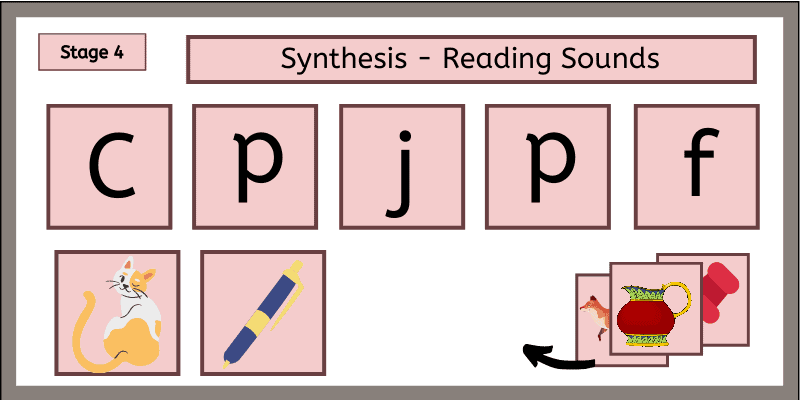
Materials:
6 Sound Cards and corresponding Picture Cards
At first glance, this may look exactly like the first stage. But there is a significant difference that we have to be aware of. This is also one of the most common mistakes that teachers make. At this stage, the child is given the letters first. The child should read the letter and find an Object or a Picture Card that matches the sound. (In the first stage the child is given the Objects/Picture Cards first. The child should say the name of the Object, figure out the first sound and find that sound from the Alphabet Box)
Stage 5: Reading the First Word
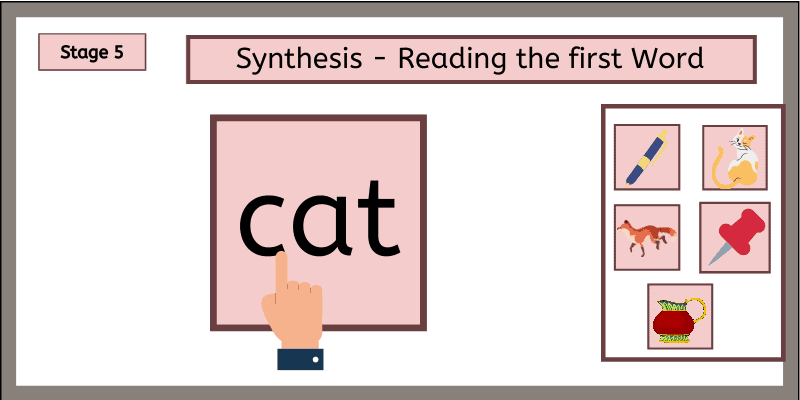
Materials:
6 Word Cards and 6 corresponding Picture Cards
Reading the first word is a big milestone in a child’s literacy journey. By this stage, the child should be able to build and write three-letter words with ease. Make sure to make this activity a positive experience for the child. Take your time and be patient (It may feel like forever. But that moment of “figuring out” is an invaluable experience.
How to introduce,
- Step 1 – Lay all the Picture Cards on the mat and keep them aside.
- Take one Word Card, and keep it in front of the child
- Ask the child to say each sound.
- Ask the child to say them a little faster
- Keep asking the child to increase the speed until it almost sounds like a word.
- Now ask the child to say it in ONE BREATH
- IMPORTANT: Give the child enough time to repeat and figure out all by himself. NEVER read for him. The first time usually takes longer. But with practice and repetition, the process gradually becomes spontaneous.
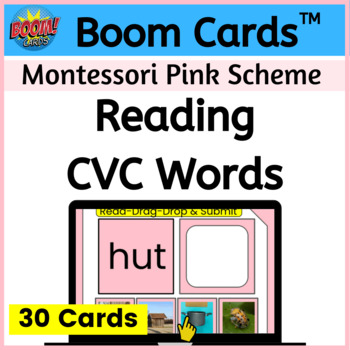
Stage 6: Stage 6: CVC Word Cards and Picture Cards – Pink Scheme
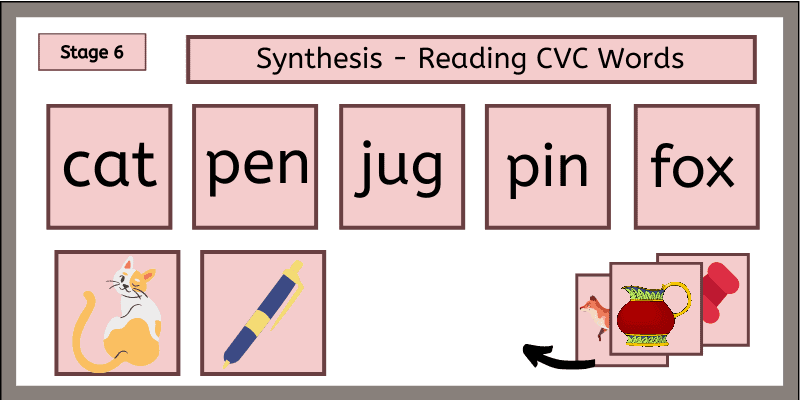
Materials:
6 Sound Cards and matching Picture Cards
After reading the first word, introduce the child to the Pink Box. The Pink Box has 5-6 Word Cards and corresponding Picture Cards or Objects. Show the child how to lay the Picture Cards at the bottom of the mat. Then take one Word Card at a time, ask the child to read and find the matching Picture Card. Let the child repeat and practice daily.
Stage 7: CVC Words – Sheets, Lists and Booklets – Pink Scheme
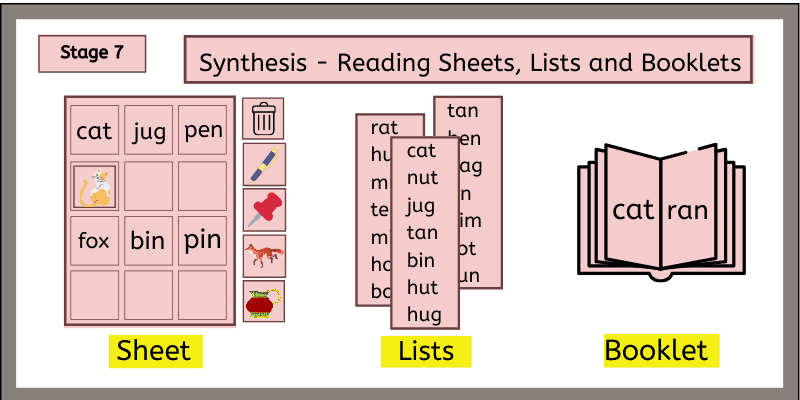
Materials:
- Sheets: A regular A4 sheet with 6 CVC words printed on it and 6 loose matching Picture Cards. The child can read the words and match the pictures.
- Lists: List of 8-10 CVC words printed and laminated on a strip of cardstock. Keep a stack of lists on a tray.
- Booklet: A tiny book (about 1.5” – 2.5”) with one CVC word on each page.
Get the Printable Montessori Pink Scheme Sentences here
Lists, Booklets and Sheets are all reading practice activities that you can keep on the shelf. These activities indirectly prepare the child for sentence reading and build confidence. Keep a few sets each at a time on 3 different trays and rotate them every week. This way the child can practise new words. Encourage the child to read at least a couple of lists or booklets every day. Lists and Booklets are a great start for reading without Picture Cards. (Always laminate shelf activities so they are durable.)
Stage 8: CVC Word Sentence Cards – Pink Scheme
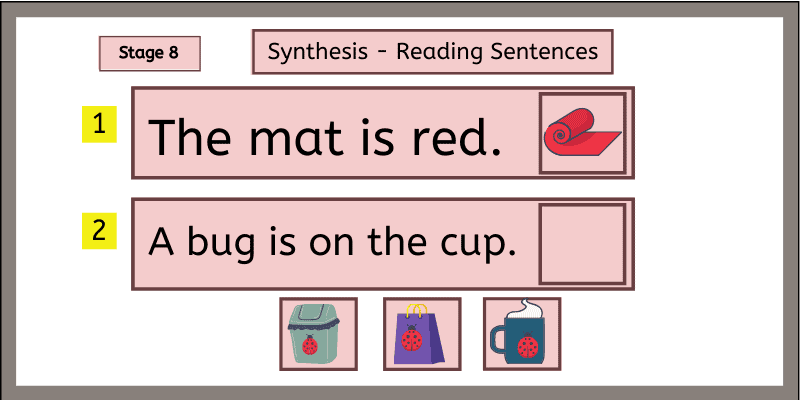
When making CVC sentences for this stage, it is important to make sure that all the words are 3 letter phonetic words. The child should be introduced to sight words “a” and “the”. Because they are not phonetic, the child is not able to decode them.
Stage 9: Reading CVC Story Books – Pink Scheme
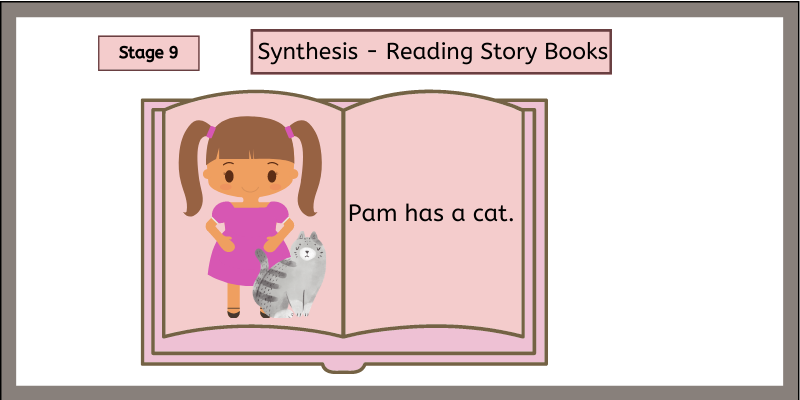
The same rule applies to CVC storybooks as well. All the words must be three-letter phonetic words except for the articles. The articles should be practiced as sight words. The storybooks should have a simple story with one or two pictures. You can add a title, name of the author and the illustrator. Make this an opportunity to introduce these words and their role.
What are Boom Cards?
Boom Cards are Interactive, Self Grading and Digital Activities. The best thing about these No-prep activities is they are paperless. This means, there is No Printing or Laminating.
Ways you can use Boom Cards
- Distance Learning
- Assign work to students
- Assign homework to students
- Give a tutorial or Lesson
- Educational, seasonal and fun games…and more
- In-person Learning
- Centers activities
- Homework assignments
- Give a tutorial or Lesson
- Educational, seasonal and fun games…and more
In order to use Boom Cards all you need is,
- A Boom account (free or paid)
- A computer, tablet, or an interactive whiteboard
- Internet connection

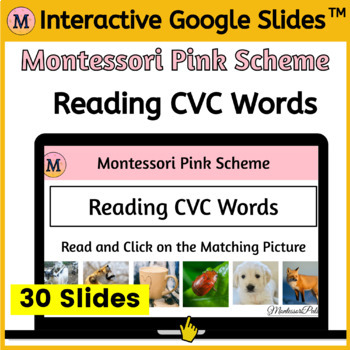
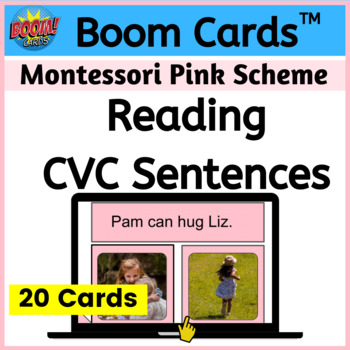
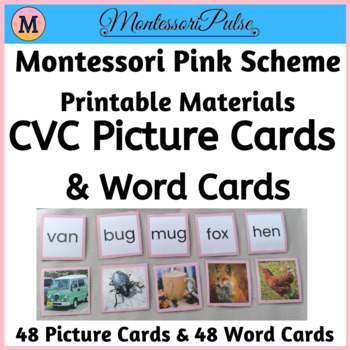
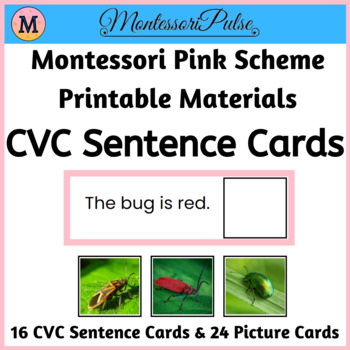
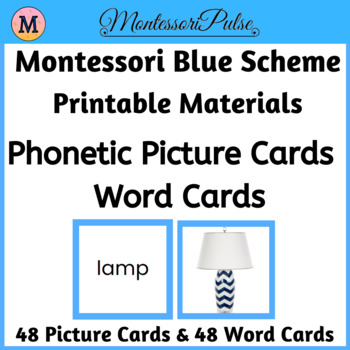
Hi Pamini,
It is wonderful to see you dedicating yourself to what brings you joy. By pursuing this passion of creating this fabulous Montessori materials, you’re surely helping everyone who wants to educate a child. I really appreciate the hard work and tremendous effort that you’re putting into it! Wishing you loads of success and very best in what lies ahead!!
Kamla
Thank you, Mrs. Sharma!
This is a great step by step for parents teaching children the fundamentals of reading. I have a 4 year old who is currently reading but I will use this as a checklist to make sure she is truly understanding the basics. Thank you!
As an early childhood educator, I’m so happy to see this available to parents! Teaching reading is hard, as not every child catches on quickly. But having amazing resources just like this is what is going to make all the difference. Highly recommend!
Thank you Melissa!
Thank you Celina
Thank you for your hard work I love your posts
Thank you, Suzanne